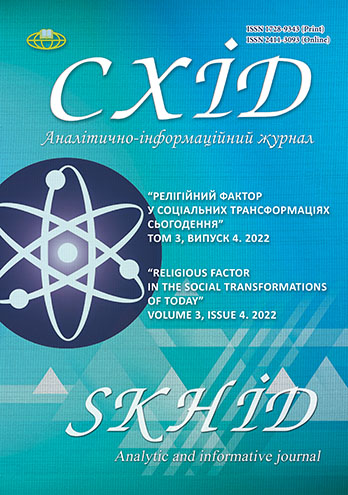The role of religion in the formation of solidarity and social cohesion in independent Ukraine
DOI:
https://doi.org/10.21847/1728-9343.2022.3(4).270031Keywords:
solidarity, cohesion, society, church, religious organizations, trust, Ukraine, toleranceAbstract
The article is devoted to the analysis of the role of the religious factor in the formation of solidarity and social cohesion in Ukraine during the period of independence. The relevance of this topic is substantiated by the fact that during the years of independence Ukraine has been going through the path of socio-political transformations, which are marked by important social processes of departure from the Soviet "inheritance" and building social relations on a new democratic basis. These transformational processes take place with certain points of particular aggravation and tension - crises, during which Ukrainians demonstrate an extremely high level of social cohesion, solidarity and readiness for self-sacrifice for the protection of common values. The authors investigate social and transformational processes in Ukrainian society, trying to apply the theoretical and methodological approach and conceptualization of the concept of solidarity carried out by Emile Durkheim and describe the experience of the transition from the USSR and gaining independence of Ukraine as the process of changing the types of solidarity from "mechanical" to "organic". Considerable attention is paid to social factors that affect the social cohesion of society in general and in Ukraine in particular. The article explores the potential of religion as a social institution that unites communities of various levels. The authors, analyzing the main trends of religious life in Ukraine during Ukraine's independence, as well as the state of public trust to the church, religious leaders, as well as the level of tolerance in society, testify the significant influence of the religious factor on social cohesion and solidarity in Ukraine. The courage, sacrifice and absolute unity of Ukrainians in resisting the full-scale aggression of Russia became another vivid confirmation of the "organic" type of solidarity that has formed in Ukraine. Different political forces, state structures of different levels, military, volunteers, civil society organizations and religious organizations acted as a single solidarity organism in defense of common values of freedom, sovereignty, territorial integrity of Ukraine, human dignity and identity. The scientific result is the substantiation of the influence of the religious factor on the formation of social cohesion through indicators of religious pluralism, the level of tolerance on religious grounds, the level of trust in religion. Indicators are derived from the methodological guidelines of E. Durkheim (in particular, his concept of different types of solidarity) and others, as well as modern approaches of international organizations engaged in research on social cohesion. The data of sociological studies of different years conducted in Ukraine, as well as the secondary analysis of sociological results, became the basis for the conclusion that religious organizations in Ukraine are active and equal subjects of civil society, which influenced and influence the formation of public attitudes and positions, and therefore social cohesion and solidarity in society.
Downloads
References
Council of Europe (2008). Report of High-Level Task Force on Social Cohesion: Towards an Active, Fair and Socially Cohesive Europe. Strasbourg. https://rm.coe.int/report-towards-an-active-fair-and-socially-cohesive-europe-janv-2008-t/1680939181
Deineko, О. (2020). Theoretical axes of the concept of social cohesion: rethinking of e. Durkheim’s scientific heritage. Ukrainian Sociological Journal, 23(-), 12-20. https://doi.org/10.26565/2077-5105-2020-23-01
Durkheim, E. (1991). O razdelenii obshchestvennogo truda. Metod sotsiologii (trans. From Engl.). Moscow, Nauka (In Russian).
Fond «Demokratichnі іnіtsіativi» іmenі Іlka Kucherіva. (2021). 30 rokіv nezalezhnostі: yakі zdobutki і problemi zrostannya bachat ukrayintsі y na shcho spodіvayutsya u maybutnomu. Sotsіologіchne doslіdzhennya. https://dif.org.ua/article/30-rokiv-nezalezhnosti-yaki-zdobutki-i-problemi-zrostannya-bachat-ukraintsi-y-na-shcho-spodivayutsya-u-maybutnomu_2 (In Ukrainian)
Giordan, G., & Pace, E. (eds.) (2014). Religious Pluralism: Framing Religious Diversity in the Contemporary World. Strasburg, Springer International Publishing. https://doi.org/10.1007/978-3-319-06623-3
Guest, Alexander & Panayiotou, Orestis (2022). Social Cohesion in Ukraine. Part I: Defining and measuring social cohesion using the SCORE. United Nations Development Programme. https://api.scoreforpeace.org/storage/pdfs/PUB_SCOREUkr21_Social_Cohesion_Volume1.pdf
Razumkov Tsentr (2021). Dovіra do іnstytutіv suspіlstva ta polіtykіv, elektoralnі orіentatsіyi gromadyan Ukrayini (sotsіologіchne doslіdzhennya). https://razumkov.org.ua/napriamky/sotsiologichni-doslidzhennia/dovira-do-instytutiv-suspilstva-ta-politykiv-elektoralni-oriientatsii-gromadian-ukrainy (In Ukraine)
Schur, Maria (2021). Shіst tez, yakі zmusyat ukrayintsіv po-novomu podivitisya na svoe relіgіyne zhittya. Radio Svoboda. https://www.radiosvoboda.org/a/religijna-sytuatsija-v-ukrajini/31253931.html
Snyder, T. (2012). Bloodlands: Europe Between Hitler and Stalin. New York. Basic Books.
Tnatni, Fouzia (2020). Valuing religious communities as key actors of social cohesion. Mondinsieme Intercultural Centre. https://rm.coe.int/-valuing-religious-communities-as-key-actors-of-social-cohesion-/1680a0b9ab)
Tsentr Razumkova. (2021). Relіgіya і Tserkva v ukrayinskomu suspіlstvі: 2000-2021rr. (sotsіologіchne doslіdzhennya). https://razumkov.org.ua/uploads/article/2021_Religiya.pdf
U.S. Department of State. Office of International Religious Freedom. (2021) Report on International Religious Freedom: Ukraine. Retrieved from https://www.state.gov/reports/2021-report-on-international-religious-freedom/ukraine/
van der Lans, J., Kemper, F., Nijsten, C., & Rooijackers, M. (2000). Religion, social cohesion and subjective well-being: An empirical study among Muslim youngsters in The Netherlands. Archiv Für Religionspsychologie. Archive for the Psychology of Religion, 23, 29–40. http://www.jstor.org/stable/23909942
Yaremchuk, S. (2017). Relіgіyniy plyuralіzm u suchasnomu sotsіologіchnomu teretizuvannі. Granі. Tom. 20 (9). s.38–45 (In Ukrainian)
Іnstitut sotsіologii NAN Ukrayiny (2020). Ukrajinske suspіlstvo: monіtoryng sotsіalnykh zmіn. Issue 7 (21). https://i-soc.com.ua/assets/files/monitoring/mon2020.pdf (In Ukrainian)
Downloads
Published
How to Cite
Issue
Section
License
Copyright (c) 2022 Ірина Кондратьєва, Ірина Фенно

This work is licensed under a Creative Commons Attribution-NonCommercial-NoDerivatives 4.0 International License.
1. Authors bear responsibility for the accuracy of facts, quotations, numbers and names used.
2. Manuscripts are not sent back.
3. The publisher does not always agree with the authors' opinion.
4. The authors reserve the right to authorship of the work and pass the first publication right of this work to the journal under the terms of a Creative Commons Attribution-NonCommercial-NoDerivatives 4.0 International License. This license allows others to distribute (copy) the published work for non-commercial purposes, provided there is mandatory attribution to its authors and a link to the first publication in our journal.
5. The authors have the right to conclude separate supplement agreements that relate to non-exclusive work distribution in the form in which it has been published by the journal (for example, to upload the work to the online storage of the journal or publish it as part of a monograph), provided that the reference to the first publication of the work in this journal is included.

